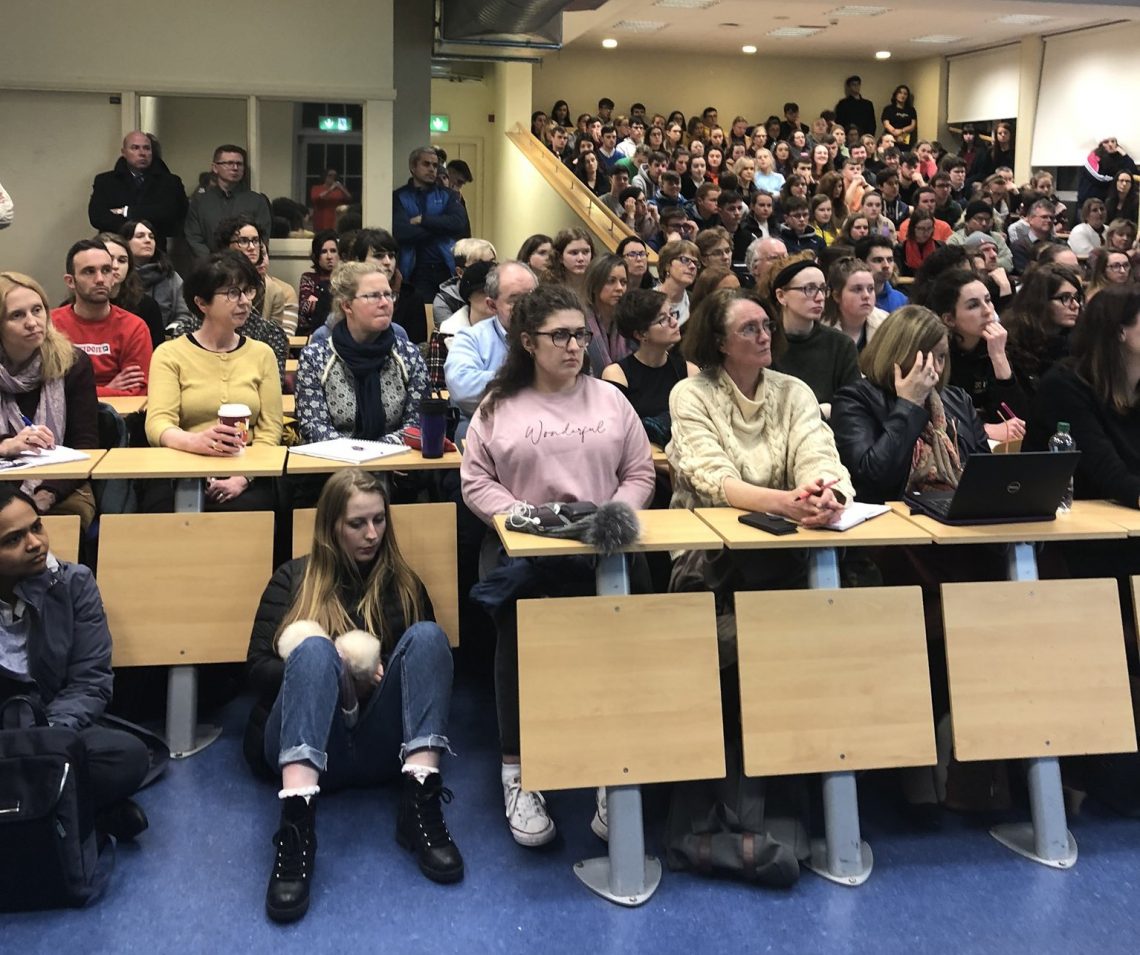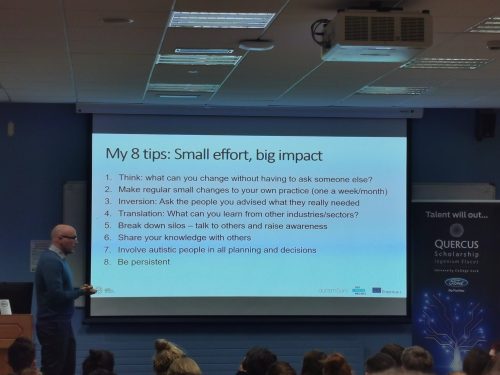
Posted on 23rd January 2020
Dr Marc Fabri delivers the Annual Quercus Lecture at University College Cork
On Tuesday 23 January 2020 Marc Fabri delivered a lecture on ‘Supporting autistic students on their journey through higher education: small changes, big impact’. The invited talk is part of UCC’s Quercus Lecture Series which promotes excellence in academia, sports, the arts and active citizenship.
Marc was invited by UCC’s Autism-Friendly University team. The lecture started off with a bang when a fire alarm made everyone leave the building and wait for the fire brigade. Thankfully there was no fire and it could commence with only a 10 minute delay. The room was full with many sitting on the steps either side of the stage.
Autistic students can face many challenges when entering and settling into university. Marc talked about the Autism&Uni project and its main outputs: a toolkit for students (www.autism-uni.org/toolkits) to navigate this transition effectively and a set of best practice guides for professionals (www.autism-uni.org/bestpractice). Both resources were designed in collaboration with the people who would be using them, and both focus on practical tip and calls to action.
The 2020 @Quercus_UCC Lecture Series kicks off tonight with the Academic Lecture by Dr Marc Fabri Snr Lecturer @ Leeds Beckett University 'Supporting autistic students on their journey through higher education: small changes, big impact' #BeginBelongBecome pic.twitter.com/43ROA9vZP7
— UCC Graduate Attributes Programme (@UCCGrAttributes) January 21, 2020
Deficits and strengths
Marc spent some time exploring different views of autism: a spectrum concepts versus the idea of a spiky profile when considering strengths and weaknesses; the focus on deficits when trying to arrange support for autistic students, and the opportunities that open up when looking at autism from a strength-based perspective.
Fantastic slide outlying the strengths of students with autism at the @Quercus_UCC lecture tonight. pic.twitter.com/0EzTBkuZgN
— QuercusUCC (@Quercus_UCC) January 21, 2020
Marc also talked about on-going research as part of the IMAGE project (www.imageautism.com) which aims to improve the employability support autistic students receive towards the end of their studies. There is a significant employment gap for autistic students – in fact amongst all disability groups autistic graduates have the worst employment prospects after leaving university. IMAGE partners are working on a number of resources designed to raise awareness, change mindsets and train those who are in positions where they can start change.
Fix what’s broken
It is important to question the status quo, especially when it comes to making adjustments for autistic students (and disabled students more generally). Adjustments are needed because whatever it is that needs adjusting was not designed in an inclusive way in the first place.
Reasonable adjustments attempt to adapt the student to the university system, when really it should be the other way round. This is not just a moral responsibility, since changing and adapting to the environment is not one of many autistic people’s strengths.
It is encouraging that higher education appears to be slowly moving away from “fixing the broken students” towards “removing systemic barriers” and the inclusive design of teaching, assessment, buildings and services. This is of course easier said than done, but we have to start somewhere and mindsets are shifting. Good examples are summer schools, anticipatory reasonable adjustments, better collaboration between disability and careers teams (UCC is an excellent example of this!), and lecturers reflecting on their practice and innovating.
Slowly moving away from "fixing the broken student" to "removing systemic barriers"#BeginBelongBecome pic.twitter.com/GGEFNQeizE
— UCC Graduate Attributes Programme (@UCCGrAttributes) January 21, 2020
The lecture closed with tips on how to change one’s attitudes, engender change in small steps, and how to involve autistic people in the conception and realisation of new ideas.

https://twitter.com/UCCGrAttributes/status/1219696494325960706?s=20
To find out more about current research in this area visit Marc’s profile at www.leedsbeckett.ac.uk/marcfabri
For more information on Quercus lectures visit https://www.ucc.ie/en/quercus/lectureseries/



